WARREN — Sergio Hairston played varsity football for Lewiston High School, but the running back had spotty attendance and left school in October 2006, his senior year.
Five months later, the 18-year-old stabbed Richard Lessard to death over a $250 drug debt and is serving a 15-year sentence for manslaughter at the Maine State Prison.
On Monday, Hairston, now 25, was one of 14 inmates who marched into a prison common room to receive an associate degree in liberal studies from the University of Maine at Augusta.
He graduated with honors, something his mother, Linda Baugh, said she always knew he was capable of doing.
“It’s wonderful,” she said. “I’m so proud of him. He’s an awesome person. He’s a very giving man.”
Mary Messenger of Lewiston, Hairston’s older sister, who makes the drive to Warren to visit him once a month, said her brother has taken “a negative thing and turned it into a very positive thing. I’m very proud of him.”
And, Hairston’s father, Stephen Hairston, said he would probably put his son’s college diploma in the trophy case at his home, tucked in among the football trophies his boys have earned.
“We’ve all been in prison right along with him,” the elder Hairston said, and seeing his son succeed has been good for the entire family.
According to Baugh, during Hairston’s first year in jail he started reading and he started to care about himself and his future. That love of reading motivated him to apply to college through the Sunshine Lady Foundation, a program funded and supervised by Doris Buffett, billionaire Warren Buffett’s sister.
After accepting his associate degree Monday, Hairston remembered how lost he felt when he was first confined to jail. “I didn’t know what was going to happen to me,” he said.
Now, he is volunteering in the prison hospice ward, training a service puppy, taking classes in Spanish and Portuguese, tutoring other students and working toward his bachelor’s degree. He expects to graduate with a BS in the spring.
According to Baugh, Hairston would like to become a teacher.
Sunshine Lady fills a gap
Buffett established the Sunshine Lady Foundation in 1996, a year after the Violent Crime Control and Law Enforcement Act passed, eliminating inmate eligibility for Pell Grants and greatly diminishing inmates’ ability to pay for college tuition while in prison. Since then, Buffett has awarded $100 million in grants to pay the college costs of inmates, including books. Of that, nearly $1 million — just over $28,000 per inmate — has been spent since 2006 to graduate 35 inmates in Maine.
Of Maine’s 14 recent graduates, half are serving time for murder or manslaughter. Thirteen graduated with honors, a much higher rate than among the UMaine System’s civilian student population.
The Maine State Prison is one of four prisons in the nation to participate in the Sunshine Lady full-tuition program. The others are the Auburn Correctional Facility and Sing Sing Correctional Facility, both in upstate New York, and the Washington State Penitentiary in Walla Walla, Wash.
The prisons are all-male and maximum-security.
According to Deborah Meehan, director of the University of Maine’s University College at Rockland, which supervises the studies at Warren, “there are prison systems across this nation that are lined up at the door” of the Sunshine Lady Foundation that “would give their eye teeth to be part of this.”
The reason?
According to Meehan, the recidivism rate is zero for Maine inmates who participate in the foundation’s college program and are released from prison. That compares to a nearly 70 percent recidivism rate among the general prison population. None of Maine’s Sunshine Lady college graduates have re-offended.
According to the Department of Corrections, the average cost to house each inmate per year is $56,269, so keeping down the return rate is a direct cost savings for the DOC’s $125 million annual budget.
Robert Payzant, 46, of Freeport is hoping to become part of the zero-recidivism success.
Payzant, who graduated with an associate degree, with honors, has spent nearly his entire adult life in jail or in prison, starting with a burglary conviction when he was 16 years old. When he was sentenced in 2007 for a robbery and aggravated assault committed in 2005, the prosecutor told the court Payzant had one of the worst criminal histories she had seen in her 20 years as a prosecutor.
But, whenever he was jailed, he was seen as a model prisoner.
During Payzant’s sentencing hearing in 2007, Justice Thomas Warren said he was a glaring example of how Maine’s prison system doesn’t adequately prepare people for re-entering society, comparing how Payzant was able to behave within the jail society but not outside of prison. That dichotomy, Warren said, made it more difficult to balance Payzant’s criminal history with the likelihood that he might be able to rehabilitate himself, according to an Associated Press report at the time.
Payzant asked Warren to “look at me and see within me something that is redeemable. I need something to strive for. I need a reason to strive.”
Payzant was sentenced to serve 18 years. The earliest he can be released is March 25, 2020, when he will be 52 years old.
During Monday’s graduation ceremony, Payzant thanked the faculty for its devotion to its work, which requires regular travel to the prison and teaching in locked classrooms. “My family thanks you. I’m pretty sure society in general thanks you. I’m pretty sure society didn’t like me too much before,” he said.
To his father, he said, “I haven’t had many of these types of moments to share with you in my life. I want you to know this doesn’t signify the end of something. It’s just the beginning.”
Meehan said one of the most uplifting elements of the prison graduation ceremonies is the pride families have in the inmates. Many haven’t had much to be proud of, she said, but recognizing the years of schoolwork and good behavior it takes for inmates to earn their degrees offers these families hope for rehabilitation.
Disciplinary problems need not apply
The application process to qualify for a Sunshine Lady grant is thorough, and although it does not take into consideration an inmate’s criminal background, the inmate’s sentence has to be long enough to finish the minimum two-year associate degree work.
The foundation, through its on-site college adviser, Donna Bancroft, reaches out to unit managers at the prison to submit recommendations for scholars. The inmates must have a high school diploma or GED equivalent, and they shouldn’t have too much college experience.
According to Meehan, the program is set up for a class of 15 to 18 inmates to move through college at the same pace, starting with freshman studies. The idea is to create a “class” cohort, like a fraternity, of men studying at the same level for the same period of time.
There are just over 900 inmates at Warren and all are eligible to apply. Once the foundation receives recommendations, the interested inmates are asked to write letters of application and get references from professionals or volunteers they work with, such as through their assigned kitchen or hospice duties.
Each applicant is asked to write an essay on a topic prompted by faculty readers, and an admission committee considers the applications.
None of the applicants can have any recent or current disciplinary problems on their prison records. If problems develop during their classwork, they can be eliminated from the program.
“Doris has very high behavior expectations,” Meehan said of Buffett. To give inmates the time to take classes and do homework, those selected to participate have to separate from whatever job they may have been assigned at the prison.
One of the goals of the program is to encourage associate-degree holders, whether or not they decide to pursue a bachelor’s degree, to become mentors or tutors in the program. Often, Meehan said, the graduates naturally evolve in other leadership programs in the prison, including prisoner advocacy and hospice work, and “they shine. They’re seen as leaders” once they’ve finished the degree program. And, she said, they tend to separate themselves from the bad influences of other inmates and stick together in fraternity.
Deputy Warden Michael Tausek, who supervises programs and services at the prison, said he would like to see the Sunshine Lady program expanded, with more students participating.
“The people who go through the college program are not the disciplinary issues,” he said, and if more people are able to participate, he believes discipline at the jail would improve. “It’s about giving them a purpose-driven life,” Tausek said, and creating a safer environment behind bars.
Despite the intense behavioral changes the inmate-scholars exhibit, not everyone supports the spending. Those include, Meehan said, some prison staffers “who don’t understand why a group of inmates would be given this privilege, and it is a privilege.”
Some staffers, in subtle and not-so-subtle ways, try to obstruct students from participating fully and getting to class, she said, calling that quiet interference “challenging.”
And there are plenty of negative comments from the general public, too, including those who are envious of Buffett’s philanthropy, Meehan said, but “95 percent of these people are getting out and they’re going to be in our communities, going to be our neighbors, and we want them to be productive.”
She said most of the inmates who participate in the college grant program were “pretty hopeless when they started,” but she sees such profound change in their behavior and aspirations that she finds the college program “certainly worth the investment.”
A chance ‘to create something beautiful’
During Monday’s graduation ceremony, Brandon Brown of Portland won the student achievement award, which is given to the associate degree graduate who maintains the highest GPA in the program. He was also the chosen student commencement speaker.
Brown, 27, is serving a 17-year sentence for attempted murder and elevated aggravated assault in the shooting of former bouncer James Sanders in Portland in June 2008. According to testimony presented at his trial, Brown shot Sanders — who is now paralyzed from the waist down — in revenge for Sanders’ use of force in kicking Brown out of a Portland nightclub several months before the shooting.
During his commencement speech, Brown was overcome with emotion in thanking his family, faculty and fellow inmates for their support.
When he arrived at Warren, Brown said, “I was positive that I had no chance of redemption at all. I was down and out. I was in a place people outside the prison would expect me to be in.”
But, he said, through the Sunshine Lady grant, “I was given a chance. I was shown a glimmer of light. That glimmer came from Doris Buffett.”
Brown called Buffett a “single ray of sunshine when we are at our darkest moment,” saying that her generosity and belief in the rehabilitation of inmates opened opportunities they never had before.
He talked about a phone conversation he had with award-winning author and Holocaust survivor Aranka Siegal as part of his human rights studies. “It literally changed a part of me,” he said. “It made me think and feel differently, and it was one of the experiences I had when going to college that made me thankful to be in prison. If I hadn’t experienced that phone call, I wouldn’t be who I am today.”
The earliest possible date that Brown can be released from Warren is March 2023, but he told faculty members that he hopes to continue his studies and aspires “to pass on the gifts that you have given me.”
He thanked them profusely for leaving their personal judgments of students’ various crimes at the gate of the prison and treating them just as they would any other student attending the University College at Rockland, an off-campus center of the UMaine System.
Brown asked the assembled family members to continue to believe in the students, and asked the students to be inspired and courageous enough to create positive change. “Create something beautiful, just like Doris Buffett has created for us.”
Sustaining change
T. Richard Snyder, chairman of the Restorative Justice Institute of Maine and former academic dean of the New York Theological Seminary, delivered Monday’s commencement address. In doing so, rather than speaking to the audience, he turned to the students seated to his left and spoke directly to them.
“This is your commencement, your new beginning,” he told them, with each having “gotten to the point of wanting to clear up the past and make a new start.”
Acknowledging the struggle to study in prison, particularly when other inmates tried to distract or belittle the students, Snyder said the students’ shared resolve is proof that “we’re capable of restructuring our lives when we become capable of recognizing the things that have shaped us.”
Now, he said, “whereever life takes you, take the knowledge you have learned. Use everything you are and everything you have to serve others to make the world better.”
Daniel Roberts, 44, of Sabattus, would like to do that.
Serving a 55-year sentence for murdering his ex-girlfriend in 2005 in a custody dispute over their then-2-year-old daughter, Roberts petitioned the court in August for a new trial, arguing that some aspects of his 2007 trial were flawed, violating his constitutional rights.
He was among the class of associate-degree honor students, and accepted his diploma enthusiastically, shaking faculty members’ hands, kissing Buffett and slapping his fellow students on the back in congratulations. If there was a class clown, he was it.
Visiting with his family after the ceremony, Roberts said he would like to pursue a bachelor’s degree. However, he said, he doesn’t think that will be possible because the pod he is currently assigned to live in is on a 20-hour lockdown. That doesn’t give him the same access to faculty as other students might have, and doesn’t always leave enough time for him to attend classes and do the homework.
He’d like to see prison administrators work with the UMaine System to accommodate inmates like him who want to continue their schoolwork. Meehan said she was hopeful some arrangement could be worked out to help inmates assigned to extended lockdown units.
Both Roberts and Hairston said the hardest part of finishing their degrees was finding the time within the confines of the prison’s daily schedule.
Deputy Warden Tausek, student adviser Bancroft and Meehan all said there is a possibility that more could be done to accommodate students’ study needs, but Tausek said prison is a complicated environment to manage. Even so, the evidence that better-educated inmates are better-behaved makes increasing access to the program worth pursuing, he said.
Faculty member Steve Moro, who teaches public speaking and debate, said the Sunshine Lady program is “transformative” for inmates and for faculty.
The students are highly motivated, he said, and he often enjoys the prison teaching environment more than a regular classroom. These students, he said, “go to a different place” when studying. They enjoy “the life of the mind” instead of the physical.
For example, he said, students learn how to debate topics in civil tones, which “is a tool they can use inside or outside” the prison. “It’s pure teaching. It’s why we went into the profession,” Moro said.
Another faculty member, John Potter, agreed.
Potter, who taught high school for more than 30 years in the Camden-Rockport area, teaches creative writing. He said inmates take their assignments seriously and, through writing, are able to focus on their emotions and make sense of their feelings.
The last graduation held at Warren was in 2011, so Monday’s event was the first ceremony for Warden Rodney Bouffard, who was appointed in May. He said Monday was “a great day, a great day” for the state prison, marveling at the happy atmosphere among inmates and families.
The inmates have “made me incredibly proud, incredibly proud,” he said. “To get a degree under these conditions is exceptional. If these gentlemen can do this here, when they leave here they will never return.”
Each graduate, at some point during the event, stopped to hug or kiss Buffett and thank her for her generosity.
Jon Dow, 27, of Hampden, who is serving 5½ years for manslaughter and aggravated criminal OUI in connection with the deaths of Tam Ngoc Tran and Cinthya Nathalie Felix Perez in 2010, called Buffett the prison population’s “philanthropic angel.”
Looking directly at her, Dow said, “Your gift is pure love and pure blessing … our chance of getting out and staying out has increased to 100 percent.”
College classes available to all Maine inmates
In Maine, the Sunshine Lady Foundation tuition grant program is available only at the Warren facility and only to a select few, but other inmates there and inmates in other prisons can take college classes through online courses once they complete what’s called an “accuplacer” test and are approved for enrollment by each prison’s respective education department.
For inmates who meet these qualifications, the Department of Corrections pays as much as two-thirds of the tuition and inmates or their families are responsible for the rest, ranging from $175 at the Bolduc Correctional Center to $220 at the Maine State Prison per three-credit class.
The DOC also pays the full cost of books, which can run up to $700 per semester.
To qualify for this DOC funding, students must maintain at least a C average and stay out of trouble while in prison.
Even though the DOC has allocated funding and assigned teaching positions and classroom space at all six of its adult correctional facilities, the program is underutilized, with less than a third of the available slots filled in September.
According to the DOC, the Maine State Prison fills the highest number of its 62 available slots, with 37 students currently studying for college degrees. Scott Fish, director of special projects for the DOC, said that high enrollment rate is proof of the success of the Sunshine Lady program.
In other facilities, where inmates have to pay a portion of their tuition, the enrollment is far less. For example, only one student is enrolled among 10 slots available at the Downeast Correctional Facility in Machiasport and no students are enrolled at the Charleston Correctional Facility, even though 20 slots are available (see accompanying graphic).
In the past, the DOC has not tracked the total number of inmates who receive degrees or the recidivism rates beyond the Sunshine Lady grants, but started tracking those numbers earlier this year at the direction of Commissioner Joseph Ponte.
University of Maine at Augusta
Associate of arts in liberal studies
* Jerry James Brown, 36, Fort Fairfield
Conviction: gross sexual assault in Aroostook County in 2006; earliest possible release date, Nov. 18, 2016.
* Brandon Sobosle Brown, 27, Portland
Conviction: attempted murder of James Sanders in Cumberland County in 2008; earliest possible release date, March 25, 2023.
* Steve Matthew Clark, 36, Portland
Conviction: murder of Robert Wagner in Cumberland County in 2006; earliest possible release date, April 8, 2043.
* Jon James Dow, 27, Hampden
Conviction: manslaughter and aggravated criminal OUI in the deaths of Tam Ngoc Tran and Cinthya Nathalie Felix Perez in Hancock County in 2010; earliest possible release date, March 14, 2016.
* Sergio Stephen Hairston, 25, Lewiston
Conviction: manslaughter of Richard Lessard in Androscoggin County in 2007; earliest possible release date, March 4, 2019.
* Robert Alan Payzant, 46, Freeport
Conviction: robbery and aggravated assault in Cumberland County in 2005; earliest possible release date, March 25, 2020.
* Daniel Paul Roberts, 44, Sabattus
Conviction: murder of Melissa Mendoza in Androscoggin County in 2005; earliest possible release date, Feb. 17, 2053.
* Dale Allen Wood, 46, Bangor
Conviction: murder of Zachary Walston in Penobscot County in 1992; earliest possible release date, Jan. 15, 2033.
Bachelor of Arts in liberal studies
* Jon Brent Dyer, 46, Yarmouth
Conviction: multiple charges of gross sexual assault in Cumberland County in 1997; earliest possible release date, July 15, 2019.
* Edwin Devaughn Keys, 32, New York City
Conviction: aggravated trafficking in scheduled drugs in Penobscot County from 2005 to 2007; earliest possible release date, Nov. 17, 2016.
* Victor E. Loveitt, 47, South Portland
Conviction: multiple charges of aggravated trafficking in scheduled drugs in Cumberland County in 2007; earliest possible release date, Aug. 20, 2017.
* Joseph Billings Rouleau, 39, Readfield
Conviction: manslaughter, aggravated assault and two counts of aggravated criminal OUI in connection with the death of Corrie Lazar in Kennebec County in 2009; earliest possible release date, May 20, 2016.
* Christopher David Shumway, 27, Caribou
Conviction: murder and gross sexual assault of Erin Sperrey in Aroostook County in 2005; earliest possible release date, Dec. 12, 2043.
More Coverage
More photos from the graduation ceremony
College classes available to all Maine inmates


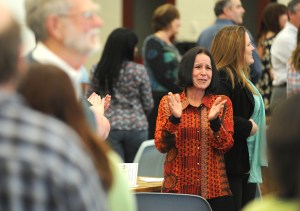


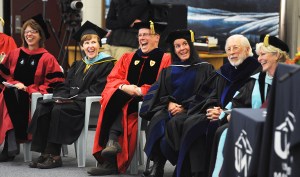
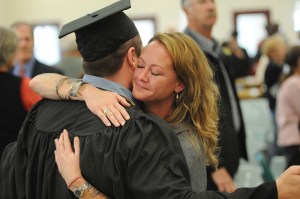
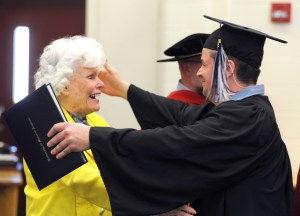
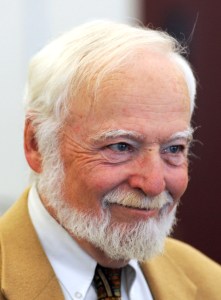
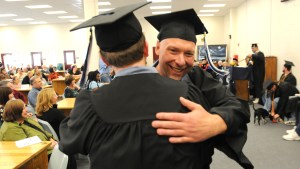
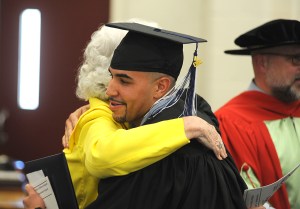
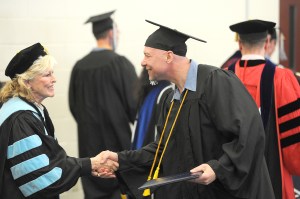
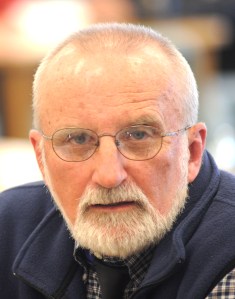

Comments are no longer available on this story